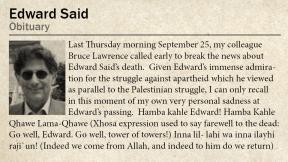
For veteran activists, the loss of Dr. Edward Said is obvious.
But even for less intellectual and less active supporters of the Palestinian cause like myself, the death of "the conscience of Palestine", as Hanan Ashrawi described him in a tribute last week, has hit hard.
Dr. Said died in New York after suffering from leukemia since 1991. He was 67.
Personally, I never completed reading any of Dr. Said's books. I remember starting on Covering Islam and Orientalism many years ago. After going over and over the texts, it was a lost cause. I put the books down and decided the man was way too brainy for me. Although I amply used his works as references in college, reading his entire groundbreaking attacks on centuries of anti-Muslim racism and media coverage was another story. Alhamdu lillah, I got As on my paper and the presentation I put together using his material, but never went back to read the books.
It was also rare for me to completely read his plethora of articles about Palestine. But I was grateful to have someone so intelligent defending Muslims and Palestinians.
Edward Said rarely came across as brash, unintelligent, and without integrity. The Palestinian cause has long been associated with violence, terrorism, and fanaticism in the United States, and continues to remain so. This of course colors who Americans side with politically and in terms of perception. According to a March 2002 poll conducted by CNN, USA Today, and Gallup, 43 percent of Americans say they side with Israel, while only 14 percent side with the Palestinians in the Israeli-Arab conflict.
But Dr. Said was too smart to be ignored as just another voice "ranting" for the Palestinians. Not only were his intellectualism and sharpness too deep, but his integrity gave him a credibility others just didn't have.
Dr. Said refused to succumb to a victim mentality. He was one of the first people to condemn terrorism against Israelis, according to his friend, the late Eqbal Ahmed, who was another intellectual and staunch supporter of Palestine. For Said, the fact that Palestinians were victims did not justify them using the wrong tactics, nor did it make them above reproach. He was extremely critical of the Palestinian Authority and its abuses of power, just as he was critical of Israeli occupation and abuses.
Said was never hesitant to criticize his own people, despite his love for them. Like a benevolent father, he realized that succumbing to a victim mentality would not serve anyone well.
"He had the integrity and compassion to extend recognition to the horrific suffering of the Jewish people and the unspeakable pain of the holocaust, and simultaneously to demand of Israel recognition of its own culpability for the plight of the Palestinian people," wrote Hanan Ashrawi in her tribute to him last week.
Thank you Dr. Said. May more voices for Palestine like yours emerge at a time when we need it the most.
More tributes to Dr. Said:
Naseer Aruri: Said's lifelong friend
Hanan Ashrawi: Member of the Palestinian Legislative Council
Alexander Cockburn: Co-editor of CounterPunch
Robert Fisk: Middle East Correspondent for The Independent
Photo Attribution: http://commons.wikimedia.org/wiki/File:Palestinian_Cultural_Mural_Honoring_Dr._Edward_Said.jpg




Add new comment